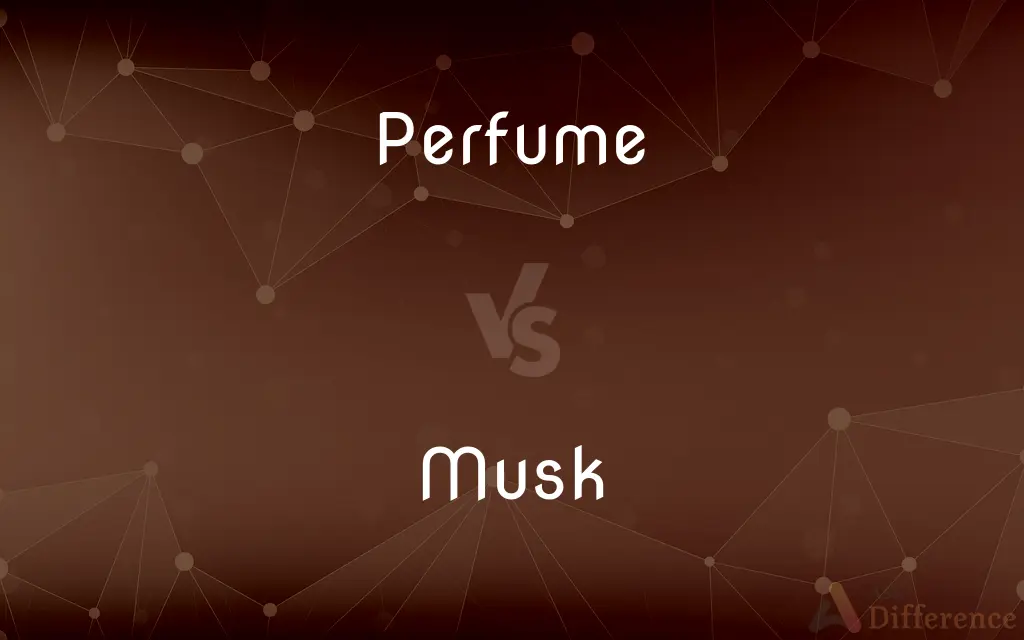Perfume vs. Musk — What's the Difference?
By Tayyaba Rehman — Updated on October 20, 2023
Perfume is a fragrant liquid typically made from essential oils and alcohol, while musk is a strong-smelling substance secreted by certain animals, often used as a base note in perfumes.

Difference Between Perfume and Musk
Table of Contents
ADVERTISEMENT
Key Differences
Perfume is a concoction of fragrances derived from various sources, crafted to emanate a pleasant and lasting aroma when applied to the skin or clothes. On the other hand, musk is a specific aromatic substance with a strong scent, originally obtained from a gland of the male musk deer but now often synthesized.
When producing perfume, manufacturers might employ a range of ingredients, such as flowers, woods, resins, and even musk, to give depth and richness to the overall fragrance. Musk, with its deep and enduring scent, acts as a fixative in many perfumes, ensuring the fragrance lasts longer.
While perfume is broadly categorized based on its concentration levels, such as eau de parfum or eau de toilette, musk stands out as a distinct and individual scent note, often discerned as warm and woody, with a hint of animalistic tones.
Over the years, the use of natural musk in perfumes has become controversial due to ethical and conservation concerns. This has led to a rise in synthetic musk variants, which mimic the scent and properties of natural musk in perfumes.
Modern perfume compositions are multifaceted, incorporating a symphony of top, middle, and base notes. Musk, owing to its longevity and potency, frequently finds its position as a base note, grounding and amplifying the other notes in the perfume.
ADVERTISEMENT
Comparison Chart
Nature
A blend of fragrant substances.
A specific aromatic substance.
Source
Derived from various sources like flowers, woods, and resins.
Originally from musk deer, now often synthesized.
Usage
Applied for a pleasant aroma on skin/clothes.
Used as a base note in perfumes for depth and longevity.
Variety
Categorized by concentration levels (e.g., eau de parfum).
Distinct scent, often described as warm and woody.
Ethical Concerns
Uses various ingredients, some sustainable, some not.
Natural musk extraction harms musk deer populations.
Compare with Definitions
Perfume
A product to mask or alter bodily odors.
He used Perfume to feel fresh all day long.
Musk
An essential base note in many fragrances.
The Musk note in the fragrance provided a lasting depth.
Perfume
A combination of essential oils and aroma compounds.
The Perfume was a blend of lavender and vanilla.
Musk
A strong-smelling secretion from the musk deer.
Natural Musk has become rare due to over-harvesting.
Perfume
A olfactory artwork created by perfumers.
The new Perfume was crafted by a famous perfumer from France.
Musk
Characterized by a warm, woody scent.
She loved the Musk undertone in her perfume.
Perfume
A representation of personal style through scent.
Her choice of Perfume was always bold and unexpected.
Musk
A similar secretion produced by certain other animals, such as an otter or civet.
Perfume
Perfume (UK: , US: ; French: parfum) is a mixture of fragrant essential oils or aroma compounds, fixatives and solvents, usually in liquid form, used to give the human body, animals, food, objects, and living-spaces an agreeable scent. The 1939 Nobel Laureate for Chemistry, Leopold Ružička stated in 1945 that "right from the earliest days of scientific chemistry up to the present time perfumes have substantially contributed to the development of organic chemistry as regards methods, systematic classification, and theory."Ancient texts and archaeological excavations show the use of perfumes in some of the earliest human civilizations.
Musk
A fixative that enhances the longevity of perfumes.
Musk makes the other notes in a fragrance linger longer.
Perfume
A fragrant liquid typically made from essential oils extracted from flowers and spices, used to give a pleasant smell to one's body
Musk-based perfumes
I caught a whiff of her fresh lemony perfume
Musk
Musk is a class of aromatic substances commonly used as base notes in perfumery. They include glandular secretions from animals such as the musk deer, numerous plants emitting similar fragrances, and artificial substances with similar odors.
Perfume
Give a pleasant smell to
Just one bloom of jasmine has the power to perfume a whole room
Musk
A strong-smelling reddish-brown substance which is secreted by the male musk deer for scent-marking and is an important ingredient in perfumery.
Perfume
A substance that emits and diffuses a fragrant odor, especially a volatile liquid distilled from flowers or prepared synthetically.
Musk
A relative of the monkey flower, formerly cultivated for a musky fragrance which has been lost in the development of modern varieties.
Perfume
A pleasing, agreeable scent or odor.
Musk
A greasy secretion with a powerful odor, produced in a glandular sac in the abdomen of a male musk deer and used in traditional medicines and formerly in the manufacture of perfumes.
Perfume
To fill or permeate with fragrance; impart a pleasant odor to.
Musk
A synthetic chemical resembling natural musk in odor or use.
Perfume
A pleasant smell; the scent, odor, or odoriferous particles emitted from a sweet-smelling substance; a pleasant odor
Musk
The odor of musk.
Perfume
(cosmetics) A substance created to provide a pleasant smell or one which emits an agreeable odor.
Musk
An odor similar to musk.
Perfume
(transitive) To apply perfume to; to fill or impregnate with a perfume; to scent.
Musk
A greasy secretion with a powerful odour, produced in a glandular sac of the male musk deer and used in the manufacture of perfumes.
Perfume
To fill or impregnate with a perfume; to scent.
And Carmel's flowery top perfumes the skies.
Musk
A similar secretion produced by the otter and the civet.
Perfume
The scent, odor, or odoriferous particles emitted from a sweet-smelling substance; a pleasant odor; fragrance; aroma.
No rich perfumes refresh the fruitful field.
Musk
A synthetic organic compound used as a substitute for the above.
Perfume
A substance that emits an agreeable odor.
And thou shalt make it a perfume.
Musk
The odour of musk.
Perfume
A toiletry that emits and diffuses a fragrant odor
Musk
The musk deer (genus Moschus).
Perfume
A distinctive odor that is pleasant
Musk
The musk plant (Mimulus moschatus).
Perfume
Fill or impregnate with an odor;
Orange blossoms prerfumed the air in the garden
Musk
A plant of the genus Erodium (Erodium moschatum); the musky heronsbill.
Perfume
Apply perfume to;
She perfumes herself every day
Musk
A plant of the genus Muscari; grape hyacinth.
Perfume
A fragrant liquid applied to give a pleasant scent.
She wore a Perfume that reminded him of summer.
Musk
The scent of human genitalia when aroused or unwashed.
I was so excited I could smell my own musk.
Musk
(transitive) To perfume with musk.
Musk
A substance of a reddish brown color, and when fresh of the consistency of honey, obtained from a bag being behind the navel of the male musk deer. It has a slightly bitter taste, but is specially remarkable for its powerful and enduring odor. It is used in medicine as a stimulant antispasmodic. The term is also applied to secretions of various other animals, having a similar odor.
Musk
The musk deer. See Musk deer (below).
Musk
The perfume emitted by musk, or any perfume somewhat similar.
Musk
The musk plant (Mimulus moschatus).
Musk
To perfume with musk.
Musk
An odorous glandular secretion from the male musk deer; used as a perfume fixative
Musk
The scent of musk
Musk
Often synthesized in modern perfumery.
Most fragrances now use synthetic Musk for ethical reasons.
Common Curiosities
What is the main difference between Perfume and Musk?
Perfume is a blend of fragrant ingredients, while Musk is a specific aromatic substance, often used as a base in perfumes.
What's the source of original Musk?
The original Musk is derived from a gland of the male musk deer.
Does every Perfume contain Musk?
No, not every Perfume contains Musk. It's one of the many ingredients that can be used in fragrance composition.
Can Musk be found in Perfumes?
Yes, Musk is often used as a base note in many perfumes to provide depth and longevity.
Are there synthetic versions of Musk in perfumes?
Yes, due to ethical and conservation concerns, many perfumes now use synthetic variants of Musk.
Why is Musk used in Perfume compositions?
Musk acts as a fixative, enhancing the longevity and depth of the Perfume.
Is it possible for a Perfume to be musk-free?
Yes, there are many perfumes that don't contain any form of Musk.
Why has the use of natural Musk become controversial?
Harvesting natural Musk often harms musk deer populations, leading to ethical and conservation concerns.
How would you describe the scent of Musk?
Musk is often described as warm, woody, and slightly animalistic.
Is Musk always animal-derived?
While traditional Musk is animal-derived, there are plant-based and synthetic musks available.
Is the Musk in most commercial perfumes animal-derived or synthetic?
Most commercial perfumes today use synthetic Musk due to ethical, sustainability, and cost considerations.
Can I identify Musk in a Perfume easily?
Musk is a base note, so it becomes more noticeable as the top and middle notes evaporate.
How does Musk influence the overall scent of a Perfume?
Musk adds depth, warmth, and longevity to a Perfume, often grounding and amplifying other notes.
Is Musk only found in strong or heavy perfumes?
No, Musk can be found in both light and heavy perfumes, depending on the composition.
Are there different types of Musk in perfumery?
Yes, there are various musks, including white musk, black musk, and others, each with its own unique scent.
Share Your Discovery

Previous Comparison
Lighted vs. Lit
Next Comparison
Slight vs. InsultAuthor Spotlight
Written by
Tayyaba RehmanTayyaba Rehman is a distinguished writer, currently serving as a primary contributor to askdifference.com. As a researcher in semantics and etymology, Tayyaba's passion for the complexity of languages and their distinctions has found a perfect home on the platform. Tayyaba delves into the intricacies of language, distinguishing between commonly confused words and phrases, thereby providing clarity for readers worldwide.














































